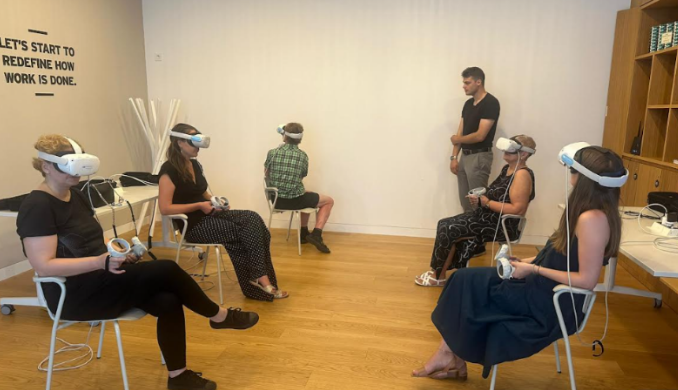Newsletter 2
What’s new?
Online learning space for language teachers
After successfully launching the XR Toolkit (INSERT THE LINK TO TOOLKIT IN YOUR LANGUAGE), our international consortium has turned its attention to developing a training package for language teachers. This package aims to equip language teachers with the necessary skills and knowledge to effectively use XR technologies with Oculus in their teaching practices for a specific target group (women refugee learners and other women with fewer opportunities). And it is our great pleasure to announce that this online learning space has now been finished in all language mutations!
The learning course consists of four interactive learning modules focusing on the use of XR tools and specifically on the integration of Oculus in language education to address the needs of women with fewer opportunities. Indicatively, the following thematic areas are covered:
- Introduction to XR – what is extended reality and what are the benefits of using XR for language learning
- Teaching methodologies/strategies to integrate XR approaches and technologies in language learning
- Designing lessons based in the use of XR for women with fewer opportunities, evaluation methods
- Specific XR tools (Oculus) appropriate to use
TO ACCESS THE ELEARNING COURSE IT IS NECESSARY TO CREATE AN ACCOUNT.
YOU CAN DO SO HERE: elearning.xrwomenproject.eu
Piloting workshops
In order to introduce the eLearning platform to language teachers and women with fewer opportunities, each member of the consortium successfully held piloting workshops.
In Prague, we have invited our participants to Spaces Smíchoff. To provide the participants with the ‘whole experience’ of learning languages through XR, we have also rented a few Oculus devices. For some participants this was the first experience with virtual reality and everybody seemed to have fun.

What can you look forward to?
To present all the outcomes of the XR-WOMEN project we will be organizing The Final XR-WOMEN Conference. The event will take place on the 9th October 2024 in Prague (venue tbc.). Invited will be women with fewer opportunities, language teachers, members of organizations or agencies supporting/working with refugees/migrants, Educational Decision Makers/Policymakers and others. Anybody interested in finding more about language learning and teaching, or interested in finding more about using XR technologies in education will be welcomed at the event. On the program there will be presentations, discussions on language learning, talks with experts on XR technologies, and more!
Look out for more information about this event. We will be glad to have you there!
Stay informed
Partners social media
SEMwell facebook
CARDET facebook
University of the Agean facebook
Academy of Humanities and Economics in Lodz facebook
Swiss Federation for Adult Learning LinkedIn


